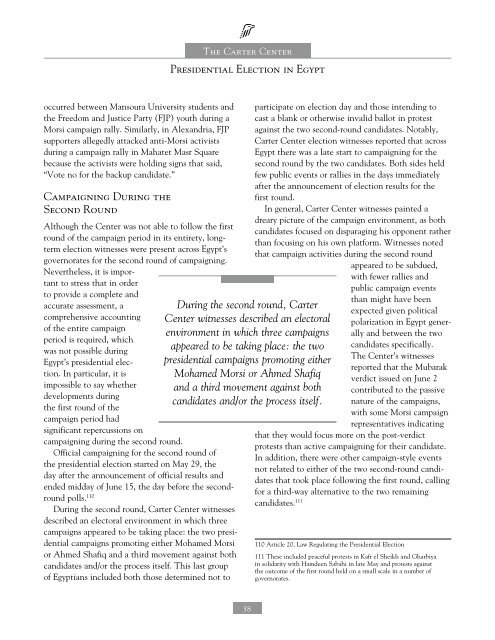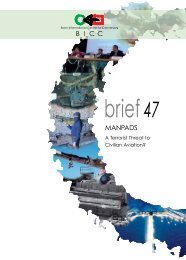egypt-final-presidential-elections-2012
egypt-final-presidential-elections-2012
egypt-final-presidential-elections-2012
Create successful ePaper yourself
Turn your PDF publications into a flip-book with our unique Google optimized e-Paper software.
The Carter Center<br />
Presidential Election in Egypt<br />
occurred between Mansoura University students and<br />
the Freedom and Justice Party (FJP) youth during a<br />
Morsi campaign rally. Similarly, in Alexandria, FJP<br />
supporters allegedly attacked anti-Morsi activists<br />
during a campaign rally in Mahatet Masr Square<br />
because the activists were holding signs that said,<br />
“Vote no for the backup candidate.”<br />
Campaigning During the<br />
Second Round<br />
Although the Center was not able to follow the first<br />
round of the campaign period in its entirety, longterm<br />
election witnesses were present across Egypt’s<br />
governorates for the second round of campaigning.<br />
Nevertheless, it is important<br />
to stress that in order<br />
to provide a complete and<br />
accurate assessment, a<br />
comprehensive accounting<br />
of the entire campaign<br />
period is required, which<br />
was not possible during<br />
Egypt’s <strong>presidential</strong> election.<br />
In particular, it is<br />
impossible to say whether<br />
developments during<br />
the first round of the<br />
campaign period had<br />
significant repercussions on<br />
campaigning during the second round.<br />
Official campaigning for the second round of<br />
the <strong>presidential</strong> election started on May 29, the<br />
day after the announcement of official results and<br />
ended midday of June 15, the day before the secondround<br />
polls. 110<br />
During the second round, Carter Center witnesses<br />
described an electoral environment in which three<br />
campaigns appeared to be taking place: the two <strong>presidential</strong><br />
campaigns promoting either Mohamed Morsi<br />
or Ahmed Shafiq and a third movement against both<br />
candidates and/or the process itself. This last group<br />
of Egyptians included both those determined not to<br />
participate on election day and those intending to<br />
cast a blank or otherwise invalid ballot in protest<br />
against the two second-round candidates. Notably,<br />
Carter Center election witnesses reported that across<br />
Egypt there was a late start to campaigning for the<br />
second round by the two candidates. Both sides held<br />
few public events or rallies in the days immediately<br />
after the announcement of election results for the<br />
first round.<br />
In general, Carter Center witnesses painted a<br />
dreary picture of the campaign environment, as both<br />
candidates focused on disparaging his opponent rather<br />
than focusing on his own platform. Witnesses noted<br />
that campaign activities during the second round<br />
appeared to be subdued,<br />
with fewer rallies and<br />
public campaign events<br />
than might have been<br />
During the second round, Carter<br />
expected given political<br />
Center witnesses described an electoral polarization in Egypt generally<br />
and between the two<br />
environment in which three campaigns<br />
appeared to be taking place: the two candidates specifically.<br />
The Center’s witnesses<br />
<strong>presidential</strong> campaigns promoting either<br />
reported that the Mubarak<br />
Mohamed Morsi or Ahmed Shafiq<br />
verdict issued on June 2<br />
and a third movement against both contributed to the passive<br />
candidates and/or the process itself. nature of the campaigns,<br />
with some Morsi campaign<br />
representatives indicating<br />
that they would focus more on the post-verdict<br />
protests than active campaigning for their candidate.<br />
In addition, there were other campaign-style events<br />
not related to either of the two second-round candidates<br />
that took place following the first round, calling<br />
for a third-way alternative to the two remaining<br />
candidates. 111<br />
110 Article 20, Law Regulating the Presidential Election<br />
111 These included peaceful protests in Kafr el Sheikh and Gharbiya<br />
in solidarity with Hamdeen Sabahi in late May and protests against<br />
the outcome of the first round held on a small scale in a number of<br />
governorates.<br />
38



